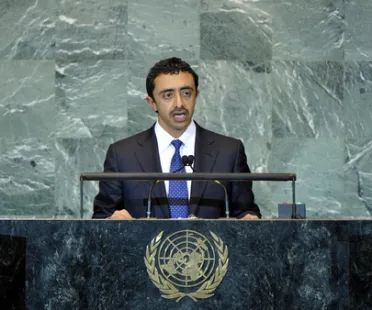Statement
Statement summary
Sheikh ABDULLAH BIN ZAYED AL NAHYAN, Minister for Foreign Affairs of the United Arab Emirates, said that global challenges were best addressed and resolved through consolidated collective action, involving all States, no matter what size or level of development. They should also be engaged in all international decision-making structures and institutions. That was why his Government carried out extensive preventive diplomacy initiatives aimed at easing tensions and resolving disputes in the region and beyond. The United Arab Emirates sought vigorously to promote humanitarian and development programmes, with a specific focus on helping countries recover from conflict or natural disasters.
It always sought to enhance peace and security and promote respect for the United Nations Charter. He said the United Arab Emirates had always shown such respect, including for sovereignty and territorial integrity when dealing with the occupation by Iran of the three United Arab Emirates islands of Abu Musa, and the Greater and Lesser Tunbs. Since the illegitimate occupation of those islands, his Government had adopted a flexible diplomatic approach to resolving that matter through peaceful means, including direct negotiations or referring the situation to the International Court of Justice.
However, the United Arab Emirates was deeply concerned that there had been no progress in direct, regional or international contacts made with Iran towards reaching a peaceful, just and permanent solution. “The actions taken by [ Iran] to change the legal, physical and demographic situations of the islands are null and void,” he said, adding that such actions violated international law. As such, his Government demanded that Iran enter into serious negotiations, or refer the matter to the World Court, “in light of its continuous illegal occupation of the three islands, which are an integral part of the territorial sovereignty of the United Arab Emirates”.
Looking beyond national borders, he said his Government was closely monitoring the major complications surrounding the Palestinian issue, including those events that had led to the end of direct negotiations. It was high time for that issue to be resolved in a comprehensive manner. The United Arab Emirates condemned Israel’s continued evasion of its international obligations. It also particularly condemned Israel’s settlement policy in the Palestinian Territory. He believed that a comprehensive and just peace between Arab countries and Israel would greatly help to reduce tensions and keep the “voices of radicalism” from using that issue as a major justification for promoting extremism and violence.
On other regional matters, he said his Government was working with the Gulf Cooperation Council to promote national dialogue among all segments of society in Bahrain. It was also supporting all efforts to achieve stability in Lebanon, and would urge the wider international community to compel Israel to end its daily violations of that country’s airspace and other trespasses. His Government was also playing a role in the Contact Group on Libya. He called for the release of the remaining frozen Libyan funds.
The representative of the United Arab Emirates, responding to the Iranian representative’s statement, said the latter had made illegal allegations to the Assembly about Iran’s occupation of the three islands that in fact belonged to the United Arab Emirates — Greater Tunb, Lesser Tunb and Abu Musa. The United Arab Emirates had repeatedly made its position well known. He expressed his “severe disappointment” over Iran’s repeated allegations every year in the Assembly. Iran’s position was in contravention to all facts, documents and history, which proved that the three islands were an integral part of the United Arab Emirates. They were part of the United Arab Emirates’ air space and exclusive economic zone.
He said he rejected Iran’s occupation and all its military and civilian measures aimed at changing the demographic and historic nature of the islands. Iran was circumventing the question of occupation by calling for marginal issues to be addressed instead of the occupation itself. He expressed hope that the international community would urge Iran to deal with that through bilateral negotiations or accept the principle of referring the case to the International Court of Justice, which would put an end to the occupation and have the three islands returned to the United Arab Emirates.
Full statement
Read the full statement, in PDF format.
Photo

Previous sessions
Access the statements from previous sessions.
